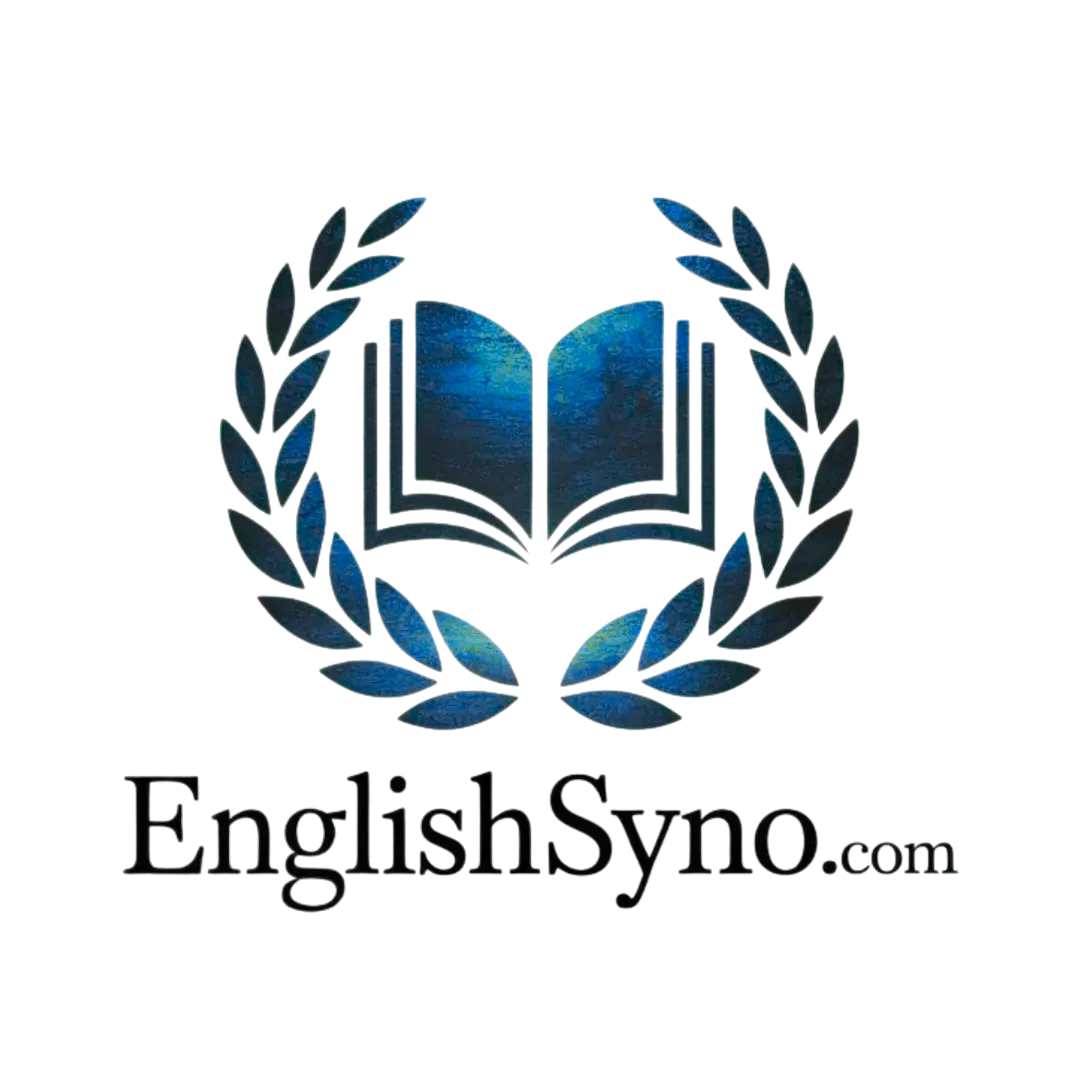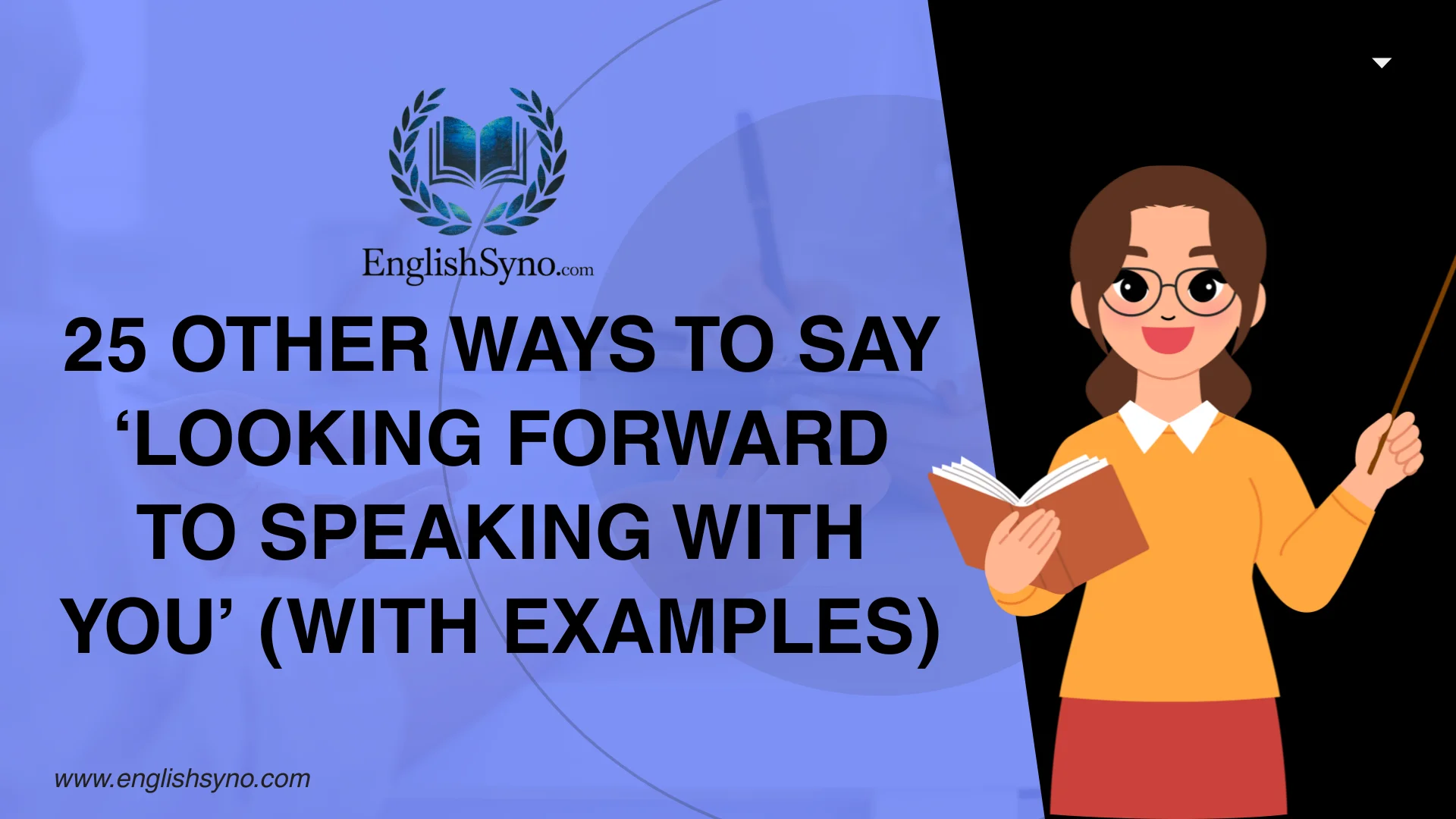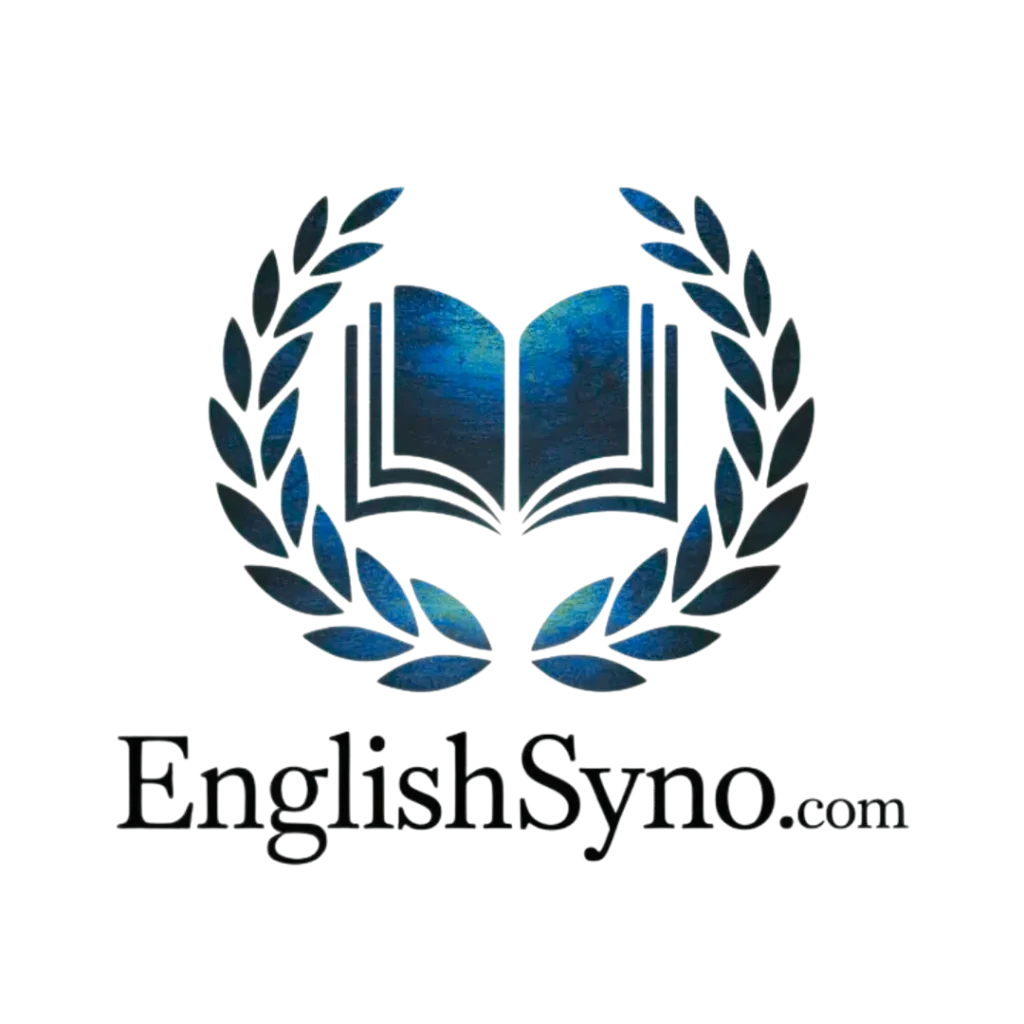When I say I am looking forward to speaking with you, it feels both natural and correct in written English, especially when addressing someone I hope to connect with. Whether it’s a friendly conversation or a professional discussion, the phrase is simple, usable, warm, and genuine. In my experience, adding a thank you makes a perfect example of sincere interest while keeping the tone respectful.
In a professional position, these words can express readiness and show you value another person’s time. They imply you want to engage meaningfully and that the exchange will happen soon. Over the years, I have relied on them in emails, meetings, and follow-ups, always making my intent clear, polite, and truly appreciated.
What Does “Looking Forward to Speaking With You” Mean?
The phrase “looking forward to speaking with you” means you feel excited, positive, or interested in having a future conversation. It shows a polite anticipation of building a connection or moving ahead in a discussion.
When to Use “Looking Forward to Speaking With You”
You use it when you want to sound professional yet friendly, especially in emails, meetings, or when setting up calls. It suits both business and personal exchanges, depending on the tone.
Is It Professional/Polite to Say “Looking Forward to Speaking With You”?
Yes, it’s both professional and polite. It conveys enthusiasm, respect, and a readiness to engage in conversation. However, too much repetition might reduce its impact, which is why alternatives help.
Pros or Cons
Pros: Clear, polite, shows enthusiasm, widely accepted.
Cons: Overused, may sound generic, and lacks creativity if repeated often.
Excited to Connect Soon
Meaning: Expresses genuine eagerness for an upcoming conversation.
Definition: Signals strong interest in communication.
Detailed Explanation: This phrase works when you want to sound enthusiastic yet still professional.
Email Example:
“Hi Sarah, thank you for scheduling the call. I’m excited to connect soon and share ideas about our project.”
Best Use: Networking, collaborations.
Worst Use: Serious complaint emails.
Tone: Upbeat, professional, approachable.
Can’t Wait to Chat
Meaning: Shows informal excitement to talk.
Definition: Highlights casual anticipation.
Detailed Explanation: Perfect for friendly situations or team chats, but not suitable for formal business emails.
Email Example:
“Hey Alex, thanks for arranging the meeting. I can’t wait to chat about the updates.”
Best Use: Internal teams, close colleagues.
Worst Use: Formal job interviews.
Tone: Casual, warm, approachable.
Looking Forward to Our Discussion
Meaning: A more formal version of the original phrase.
Definition: Stresses the importance of the upcoming discussion.
Detailed Explanation: Adds a layer of seriousness and respect to the message.
Email Example:
“Dear Mr. Lee, thank you for your time. I’m looking forward to our discussion on strategy.”
Best Use: Professional meetings, client calls.
Worst Use: Casual texts with friends.
Tone: Professional, polite, respectful.
Eager to Hear Your Thoughts
Meaning: Centers on the other person’s input.
Definition: Highlights curiosity and value for their perspective.
Detailed Explanation: Makes the other person feel valued and respected.
Email Example:
“Hi Dana, thank you for reviewing the draft. I’m eager to hear your thoughts on the revisions.”
Best Use: Feedback requests.
Worst Use: General casual conversation.
Tone: Respectful, thoughtful, professional.
Anticipating Our Conversation
Meaning: Formal, anticipates future talk.
Definition: Communicates readiness.
Detailed Explanation: Ideal for formal business exchanges.
Email Example:
“Dear Ms. Khan, thank you for the opportunity. I am anticipating our conversation next week.”
Best Use: Job interviews, business proposals.
Worst Use: Informal chats.
Tone: Polite, formal, clear.
Excited to Speak With You
Meaning: Similar to the main phrase but with more enthusiasm.
Definition: Blends positivity and politeness.
Detailed Explanation: Slightly stronger than “looking forward to speaking with you.”
Email Example:
“Hi John, thank you for arranging the meeting. I’m excited to speak with you about this opportunity.”
Best Use: Networking, opportunities.
Worst Use: Complaint contexts.
Tone: Friendly, upbeat.
Looking Forward to Our Call
Meaning: Specifies the medium (call).
Definition: Keeps it relevant to phone or video meetings.
Detailed Explanation: Clear and context-specific.
Email Example:
“Hi Raj, I’m looking forward to our call on Monday to discuss progress.”
Best Use: Scheduled calls.
Worst Use: Non-call scenarios.
Tone: Professional, clear.
Can’t Wait to Speak With You
Meaning: Informal, energetic.
Definition: Strong enthusiasm.
Detailed Explanation: Use for close colleagues, friends, or casual work chats.
Email Example:
“Hey Mike, I can’t wait to speak with you about your travel stories.”
Best Use: Informal messages.
Worst Use: Executive-level business emails.
Tone: Friendly, personal.
Eager to Connect
Meaning: Shows anticipation for connection.
Definition: Polite and professional.
Detailed Explanation: Works across professional and semi-casual spaces.
Email Example:
“Hi Bella, I’m eager to connect and learn more about your perspective.”
Best Use: Networking.
Worst Use: Overly formal settings.
Tone: Warm, respectful.
I Look Forward to Speaking With You Soon
Meaning: Traditional, professional.
Definition: Reliable and timeless.
Detailed Explanation: Slightly more formal than the base phrase.
Email Example:
“Dear Professor, I look forward to speaking with you soon about the research.”
Best Use: Professional meetings.
Worst Use: Text messages with friends.
Tone: Professional, respectful.
Excited to Learn More
Meaning: Shows eagerness to gain insights.
Definition: Expresses curiosity and anticipation for new information.
Detailed Explanation: This phrase works especially well when you’re meeting someone for advice, mentorship, or new ideas.
Email Example:
“Hi Carla, thank you for arranging the session. I’m excited to learn more about your career journey.”
Best Use: Mentorship, learning discussions.
Worst Use: Formal negotiations.
Tone: Curious, respectful, eager.
Looking Forward to Hearing From You
Meaning: Shifts focus to the other person’s reply.
Definition: Expresses anticipation for their response.
Detailed Explanation: Common in professional emails, often used to close messages politely.
Email Example:
“Dear Ms. Green, thank you for reviewing my application. I’m looking forward to hearing from you.”
Best Use: Job applications, feedback.
Worst Use: Casual chats with friends.
Tone: Professional, polite.
Excited About Our Conversation
Meaning: Adds enthusiasm to the original phrase.
Definition: Shows positivity toward upcoming dialogue.
Detailed Explanation: Good balance between professional and warm tones.
Email Example:
“Hi Dr. Smith, I’m excited about our conversation on Thursday.”
Best Use: Scheduled discussions.
Worst Use: Critical complaint situations.
Tone: Warm, enthusiastic.
Anticipating Your Response
Meaning: Shows patience and expectation.
Definition: Respectfully waits for their input.
Detailed Explanation: Best when you want to sound polite yet slightly formal.
Email Example:
“Dear Alex, thank you for your feedback. I am anticipating your response soon.”
Best Use: Client communications.
Worst Use: Casual or playful exchanges.
Tone: Formal, respectful.
Can’t Wait to Collaborate
Meaning: Shows excitement for teamwork.
Definition: Anticipates working together.
Detailed Explanation: Perfect for joint projects, creative teams, and business collaborations.
Email Example:
“Hi Jordan, thanks for reaching out. I can’t wait to collaborate on this exciting project.”
Best Use: Teamwork, creative partnerships.
Worst Use: One-time meetings.
Tone: Collaborative, energetic.
Looking Forward to Sharing Ideas
Meaning: Focuses on the exchange of ideas.
Definition: Anticipates brainstorming or mutual input.
Detailed Explanation: Especially effective in creative or problem-solving contexts.
Email Example:
“Hi Priya, I’m looking forward to sharing ideas with you in our session.”
Best Use: Brainstorming meetings.
Worst Use: Formal high-level discussions.
Tone: Creative, open, positive.
Excited to Work With You
Meaning: Highlights enthusiasm for future teamwork.
Definition: Communicates readiness for professional collaboration.
Detailed Explanation: Great for new partnerships, hiring, or project starts.
Email Example:
“Dear John, I’m excited to work with you and achieve great results together.”
Best Use: Hiring emails, partnerships.
Worst Use: Informal chats.
Tone: Professional, encouraging.
Looking Forward to Connecting
Meaning: Polite anticipation of building rapport.
Definition: Neutral, professional, yet approachable.
Detailed Explanation: A safe phrase to use when tone is important but details are not yet known.
Email Example:
“Hi Sam, I’m looking forward to connecting and learning more about your team.”
Best Use: Networking, first meetings.
Worst Use: Too casual for friends.
Tone: Neutral, professional.
Can’t Wait to Exchange Ideas
Meaning: Focuses on idea-sharing with enthusiasm.
Definition: Indicates collaboration and learning.
Detailed Explanation: Best used for brainstorming or innovation-driven conversations.
Email Example:
“Hi Kelly, I can’t wait to exchange ideas during tomorrow’s workshop.”
Best Use: Creative projects, innovation.
Worst Use: Formal contract negotiations.
Tone: Creative, enthusiastic.
Excited About Our Meeting
Meaning: Directly anticipates an upcoming meeting.
Definition: Adds positivity to scheduled events.
Detailed Explanation: Keeps a professional tone with a touch of warmth.
Email Example:
“Dear Robert, I am excited about our meeting on Wednesday.”
Best Use: Professional meetings.
Worst Use: Personal conversations.
Tone: Polite, enthusiastic.
Looking Forward to Meeting You
Meaning: Expresses anticipation for an in-person or virtual meeting.
Definition: A polite way to highlight enthusiasm for a scheduled introduction.
Detailed Explanation: Perfect when you want to be respectful but not overly casual, often used in professional introductions.
Email Example:
“Dear Emily, thank you for arranging the interview. I’m looking forward to meeting you on Friday.”
Best Use: Interviews, professional introductions.
Worst Use: Casual text with friends.
Tone: Polite, professional.
Excited to Finally Talk
Meaning: Shows eagerness after a delay or long wait.
Definition: Highlights relief and excitement about finally speaking.
Detailed Explanation: Works well when communication has been delayed, or when you’ve been waiting for a chance to connect.
Email Example:
“Hi Chris, after weeks of planning, I’m excited to finally talk tomorrow.”
Best Use: Long-awaited meetings.
Worst Use: Formal business openings.
Tone: Personal, warm, enthusiastic.
Can’t Wait to Hear From You
Meaning: Centers on anticipating their reply.
Definition: Shows eagerness for communication from the other side.
Detailed Explanation: Slightly informal but still polite, this is a more emotional version of “looking forward to hearing from you.”
Email Example:
“Hey Maria, thanks for sharing the update. I can’t wait to hear from you with your thoughts.”
Best Use: Friendly colleagues, casual teams.
Worst Use: Strictly formal job interviews.
Tone: Casual, warm.
Looking Forward to Continuing Our Conversation
Meaning: Signals ongoing dialogue and future progress.
Definition: Suggests that you value what has already been discussed and are eager to move forward.
Detailed Explanation: Great for follow-ups after calls, interviews, or meetings.
Email Example:
“Dear Mr. Johnson, thank you for your time today. I’m looking forward to continuing our conversation next week.”
Best Use: Follow-ups, progress meetings.
Worst Use: First-time introductions.
Tone: Professional, respectful.
Excited to Hear Your Ideas
Meaning: Focuses on valuing the other person’s creative input.
Definition: Demonstrates curiosity and respect for their perspective.
Detailed Explanation: Ideal for brainstorming, teamwork, or any collaborative situation.
Email Example:
“Hi Taylor, I’m excited to hear your ideas during our session tomorrow.”
Best Use: Collaborative projects.
Worst Use: Formal contract discussions.
Tone: Creative, encouraging.
Final Thoughts
Finding the right words can transform your communication from ordinary to meaningful. Saying “looking forward to speaking with you” is already a warm and polite way to show anticipation, but relying on alternatives allows you to express yourself with more care, empathy, and authenticity. Each phrase in this guide helps you adapt to the context — whether it’s a professional meeting, a networking call, or a casual chat with colleagues.
What makes these alternatives powerful is not just the wording, but the tone and intention behind them. Choosing expressions like “eager to hear your thoughts” or “excited to connect” ensures that the recipient feels valued and appreciated. It also prevents your message from sounding repetitive or generic, which is important in professional communication.
When used thoughtfully, these phrases can help you build stronger relationships, convey genuine interest, and create a more personal connection. Instead of overusing one phrase, rotating between these alternatives will make your messages sound fresh, sincere, and truly engaging. Words are powerful tools, and the way we choose them can influence how others perceive our intent and character. So the next time you want to end an email or prepare for a call, pick a phrase that feels authentic to you and appropriate for the situation.
FAQs
What does “looking forward to speaking with you” mean?
It means you are politely expressing anticipation and interest in having a conversation, often used in professional or friendly communication.
Is “looking forward to speaking with you” professional?
Yes, it is considered professional and polite, making it suitable for interviews, client meetings, and formal emails.
Can I use “looking forward to speaking with you” in casual settings?
Absolutely. While often professional, it also works in casual chats when you want to sound warm and polite.
What are alternatives to “looking forward to speaking with you”?
Alternatives include “eager to connect,” “excited to talk,” and “can’t wait to chat,” depending on tone and context.
Why should I avoid overusing this phrase?
Overuse can make your communication sound generic. Switching up phrasing keeps your messages fresh and engaging.
Is “looking forward to hearing from you” the same thing?
No, it’s different. “Looking forward to speaking” anticipates a conversation, while “hearing from you” expects a response.
Can I use this phrase in job applications?
Yes, it’s widely accepted in job applications and interview follow-ups to show professional interest and readiness.
Does tone matter when using this phrase?
Yes, your tone should match the context — professional for business, friendly for casual conversations.
Is it polite to use with clients?
Definitely. It signals respect and enthusiasm, making clients feel valued before a meeting or call.
Can this phrase help in networking?
Yes, it works perfectly in networking, showing you are approachable and excited to make connections.
Should I always use it at the end of an email?
Not always. It works best at the closing, but vary your phrasing to avoid sounding repetitive.
What’s the best casual alternative?
A great casual option is “can’t wait to chat,” which feels friendly and approachable without being too formal.
Is it okay to use in follow-up emails?
Yes, especially phrases like “looking forward to continuing our conversation” after meetings or interviews.
Can I use it in international communication?
Yes, it’s clear and polite across cultures, making it a safe choice in global business emails.
Does this phrase show confidence?
Yes, it reflects confidence, readiness, and genuine interest, leaving a strong impression in personal and professional contexts.

Muhammad Altaf is an English language specialist and professional content strategist with over 10 years of experience writing and teaching practical English usage, professional communication, and tone awareness. His work focuses on helping readers express ideas clearly, naturally, and confidently in real-world contexts.


